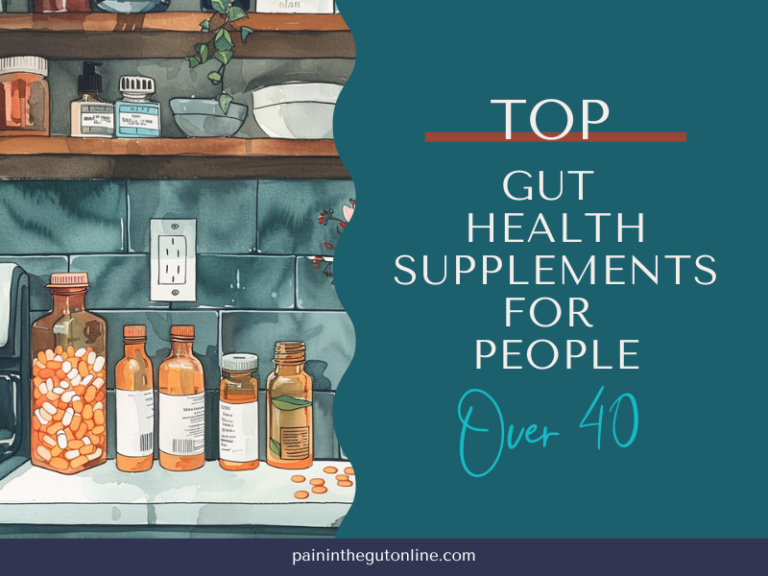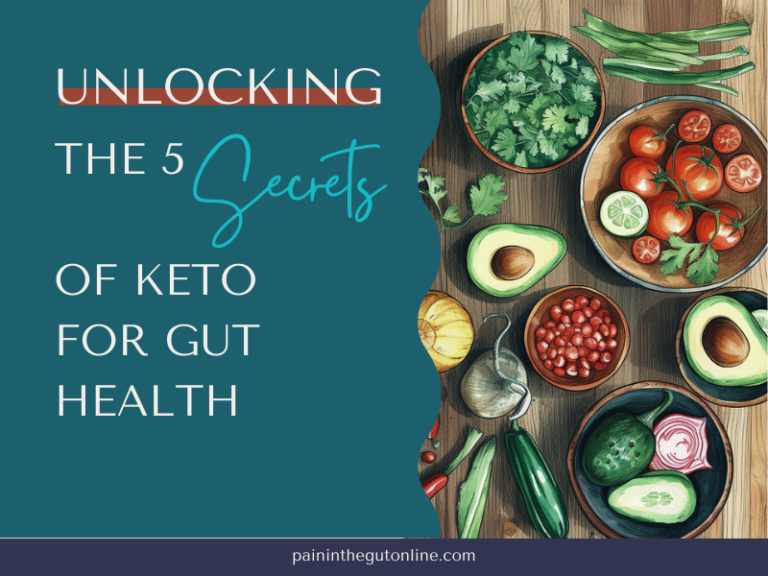SIGNS YOUR GUT NEEDS ATTENTION
9 min read/ 1773 words
Your gut has a lot to tell you if you just take the time to listen. It speaks to you in many different ways, some obvious, like gas and cramping. However, some other ways may not be as easily recognized as gut issues. So, let’s talk about 10 Clear Signs Your Gut Needs Attention Now.

Walkthrough this scenario with me:
It’s 8 p.m., and you’ve just finished tidying up the kitchen and preparing stuff for the next day. Now it’s finally time for your favorite day activity: TV time! You put on your pajamas and return to the kitchen for a snack.
What do you grab?
- A glass of water to stay hydrated while you sleep, a handful of cut-up veggies and hummus, and a small bowl of nuts, dried fruit, and dark chocolate chips.
OR
2. A soda, a bag of chips, a beef stick, some cookies, and a candy bar just in case.
Be honest with yourself.
Which would you actually choose? No one is looking at you, and no one will know how you answer, so just be honest.
Obviously, you know which one you should choose, but would you?
I can’t say I would 100% of the time.
But that’s okay. Indulging occasionally isn’t why your gut is so unhappy. It’s choosing option #2 all the time that’s caused things to get a little wobbly and a lot of irregular.
Table of Contents
What is the gut, and why should you care?
Digestive problems can affect your entire body and make your life miserable. From mild symptoms to severe ones, it can be difficult to pinpoint the causes. You may experience symptoms you don’t realize are related to your gut at all.
The gut refers to the parts of your gastrointestinal tract from the stomach to the intestines. The microbiome is full of bacteria, and your body needs to digest food properly. The healthy bacteria in your gut help to break down food so your body can get nutrients from it. The process is only possible when your digestive system is healthy and running smoothly.
Unfortunately, certain foods we eat in our modern world are actually hurting our guts by causing an imbalance of healthy and unhealthy bacteria. Too much unhealthy bacteria can lead to digestive discomfort and actually prevent our bodies from getting proper nutrients from the foods we eat.
A healthy, happy gut helps your body stay healthy. Your gut does so much more for your body than you may realize. It works closely with your immune system to help you fight off infections, viruses, and chronic illnesses. It produces serotonin so you can fall asleep and stay asleep. Your gut communicates directly with your brain to help keep your mental health and hormones steady.
How can you tell if your gut is unhappy?
You will likely notice quickly when your gut is out of whack and unhappy. Certain symptoms are easily recognizable as occurring within your digestive tract, causing digestive discomfort.
Diarrhea, stomach pain, gas, or nausea may occur shortly after eating. If these symptoms happen just once or infrequently, you may not need to be concerned, although I suggest paying close attention to the food that triggered the event and consider avoiding that food in the future.
Where you really need to pay attention is when these symptoms occur more frequently. If you find that every time you eat fried food, you need to run to the bathroom, your gut is trying to tell you something, and you need to listen to it.
While some imbalances in your gut may resolve themselves quickly, others may become chronic, leading to more serious issues that require medical attention.
Now, let’s discuss the reason you’re here.
10 Clear Signs Your Gut Needs Attention Now
The signs of digestive problems go beyond stomach cramping and diarrhea. As mentioned, your gut is linked to your overall health and well-being. Paying close attention to what your gut is telling you is the key to living a healthy life.
10 Signs Your Gut Needs Attention:
- Bloating
- Chronic or excessive gas
- Heartburn or acid reflux
- Food allergies or intolerances
- Headaches
- Gaining or losing weight unintentionally
- Sugar cravings
- Trouble sleeping
- Skin conditions
- Autoimmune diseases
Bloating. I’m talking about the kind of bloating that occurs while you’re still eating, the kind that makes you feel overfull and miserable, where your stomach goes from flat to 4 months pregnant in 5 minutes, and the kind that is usually followed up by the next symptom in this list.
Excessive or chronic gas. This can be either burping or farting and is likely a whole lot of both. If you can’t control how much gas your body releases, you have a problem with your gut. While it’s normal to burp a couple of times after eating, if you’re still burping hours later, that isn’t normal.
Heartburn or acid reflux. I’m referring to that burning sensation in the back of your throat immediately following a meal or that feeling like you burped up a little stomach acid. This indigestion is an unmistakable sign that something is amiss with your gut. You shouldn’t be popping an acid reducer after every meal. Plus, having stomach acid(see that word? ACID) shouldn’t be in your throat; it can cause serious damage to your esophagus and may lead to chronic disease.
Food allergies or intolerances. How many times have you heard someone say they used to be able to eat walnuts(or insert any other food here) when they were kids, but now they are allergic? A common one is dairy. Show of hands who used to drink a glass of milk every day growing up, but now you avoid milk and all other dairy products like it’s poison because it essentially is for your digestion. It isn’t “normal” to grow intolerant to a food. The intolerance is happening for a reason; that reason is that your gut is imbalanced and asking for help.
Headaches. Your gut and brain are linked by different systems throughout your body, including your immune, endocrine, and nervous systems. This is called the gut-brain axis. While more research is still needed, many studies have shown a link between digestive problems and headaches. The next time you have a headache, note any food or drink you had before it and how your gut is feeling during the headache.
Gaining or losing weight unintentionally. Your gut’s health directly affects how much energy you have and how quickly and for how long you feel full. An unhealthy gut affects your absorption of nutrients, leading to low energy levels, which can cause weight gain. On the other hand, when your body isn’t getting proper nutrition, you may find that you are losing weight. Also, bloating can make you feel fuller faster, causing you to eat less because now you’re full of gas instead of food.
Sugar cravings. It’s a simple fact: the more sugar you eat, the more sugar your body craves. It’s a vicious cycle. Unfortunately, you consume sugar way more often than you realize because sugar is hidden within foods you probably think aren’t sugary. Things like yogurt, crackers, bread, and more add countless amounts of sugar to your daily intake. Sugar causes energy levels to spike and drop quickly, leaving your body craving more. Plus, sugar has no nutritional value whatsoever. Instead, your body uses even more energy trying to digest the sugar leaving you feeling unsatisfied and craving, you guessed it, even more sugar.
Trouble sleeping. Research is still being done on the link between an unhealthy microbiome(gut) and sleep problems. However, the gut does seem to affect the sleep-wake cycle, and you already know how it affects hormones, including serotonin, which helps you feel sleepy. If you’re experiencing sleep troubles, your diet may be to blame.
Skin conditions. Hello, rosacea. I’m looking at you. There is a direct link between gut health and skin conditions such as acne, rosacea, psoriasis, and eczema. As I said before, your gut is linked to other systems in your body, including your skin. An unhealthy microbiome can lead to inflammation and excess oil reproduction on your skin, both of which can lead to these chronic skin conditions.
And lastly,
Autoimmune disease. What is autoimmune disease? It is a condition in which your immune system attacks your body. 80% of your immune system is found within the gut. Type 1 diabetes, lupus, IBS, Hashimoto’s thyroiditis, and Crohn’s Disease may all be linked to gut health. Without testing from a medical professional, you can’t tell if your autoimmune disease is caused by your gut health or not. If you suspect it could be, seek advice from your doctor.
I have some of these signs. What should I do next?
As a certified health coach, I can help you make some simple lifestyle changes that will improve your gut health and overall well-being.
“Better gut health is a whole-body experience”
While you cannot change your gut overnight, it can be done over time with the right mix of happy gut foods and a healthy lifestyle.
Are you ready to make a change?
Take our Gut Health Assessment!
Then, stick around for our weekly newsletters, full of our latest content, digestive tips, subscriber exclusives, and more! Click the link above to learn more about our guide, and subscribe to our newsletter.
Not quite ready to take the assessment yet?
Read about the 5 Reasons You Shouldn’t Ignore Indigestion. Ignoring it will not make it go away; in fact, it could make it worse.
Learn more about gut health and all things digestion-related here.
Like and follow us on TikTok for more information.
Disclaimer
This article does not diagnose, treat, prevent, or cure any illness or disease. The information provided in this article is for general educational purposes, has not been reviewed nor approved by the FDA, and is not intended to take the place of advice from your medical professional, licensed dietitian, or nutritionist. It’s always a good idea to rule out anything major before changing your habits or diet to improve your gut health. Share your symptoms with your doctor so they can help you rule out a major illness. You are solely responsible for your health care and activity choices. Participation does not constitute a client-coach relationship.






